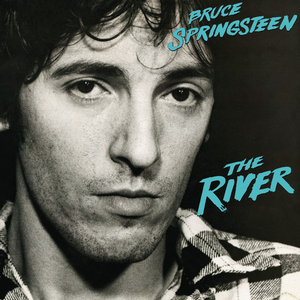Published on Feb 9, 1998
With 1984’s
Born In The USA, some critics camed that Bruce Springsteen
had sold out to pop sensibilities, and his lyrics were becoming
sentemental. These critics were wrong, however, because these thing
actually happened four years earlier on
The River.
The Boss has gone through different stages: street poet, folkie,
adult contemporary, and finally icon. But the Springsteen most
people think of is the leather-clad rocker of the mid ’70s, when
his best albums were produced (
The Wild, The Innocent & The E-Street Shuffle and
Born To Run). Most people don’t think “Bruce Springsteen =
Hopeless Romantic.” That is where
The River diverges from the atypical Bruce album. Every song
here is a love song of sorts, and the album has a haunting quailty.
He made other albums that were just as dark, such as
Nebraska and
The Ghost Of Tom Joad, but these were primarily stories
about other people in hopeless situations. The angst-ridden
protagonist in each of the 20 songs on this double album is
Springsteen himself. This may sound like the album is self-serving
and full of drunken lamenting. 1.) It is. 2.) That’s what makes it
so great.
Let’s get the hits out of the way. “Hungry Heart” was his first
hit to crack the top ten, and perhaps that’s because it doesn’t
even sound like Springsteen. His scratchy, slightly off-key vocals
are completely gone on this song. I don’t know what he was drinking
that night, but he sounds eerily smooth and radio-ready. It’s not a
bad song, but it’s also not a high point on the album. The title
track is probably the most famous song here. It is a classic song,
and remains prelevalent on AOR stations across the country. The
version on his triple-CD live album is better, but this version is
still great. The haunting percussion always seems to find just the
right tome, and he’s wise enough not to play too fast.
The best song on the album, however, doesn’t come until near the
end of the second disc. “Drive All Night,” a nearly nine-minute
ballad of repentance, and the emptiness that comes from the
“prison” in our hearts. This song is comparable to his best love
epics (i.e. the entire second side of
The Wild, The Innocent, The E-Street Shuffle).
Of course there were other contributing forces to the album. He
had just lost his father, and Was beginning to question the E
Street Band’s appropriateness to the different kinds of music he
wanted to make. Speaking of the band, he’s wise enough to keep them
low-key enough so that the words mean as much as the music, This
would have made
Born In The USA a better album, but maybe he was just trying
to sell records by then. In fact, the only real solo on the album
is a beautiful, smoking sax working by Clarence Clemons, the most
notable member of the band.
The amazing thing about the album, and perhaps the only thing
that keeps it from making you cry everytime it’s played is the way
the pop hooks undercut the lyrical interpretations. This, in and of
itself, is a stroke of production genuis, and makes the album worth
buying alone. A more satisying paradox in music has rarely been
achieved. And then there are the songs.
All of the pop throw-aways clock in at under four minutes, and
all of them are fitfully entertaining. From the mother-in-law
kiss-off, “Sherry Darling,” to the “here’s another slice of pop
culture pie” rocker, “Cadillac Ranch,” these songs are
instantaneously recognizable in their situation, and many are also
very funny. But you won’t laugh, because you know that just around
the next corner is another grey monster. The way the pop songs and
the dark stuff alternate make the album all the better on repeat
listens.
I generally listen to music that fits my mood. If I’m depressed,
I either put on some more upbeat riffs, or some really depressing
music if I feel like wallowing. When I’m happy, I usually listen to
more challenging, progressive albums, or maybe a touch of country.
The River, however, acts as an emotional catharsis,
regardless of my mood. If I use it sparingly, it always restores my
equilibrium. I’m not promising that will do the same for you, but
it’s worth purchasing either way. It’s not the greatest Springsteen
album, but it is the last truly great one.
